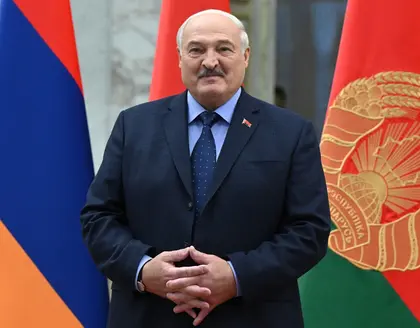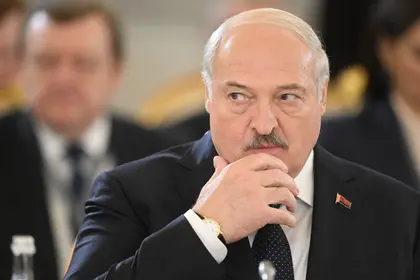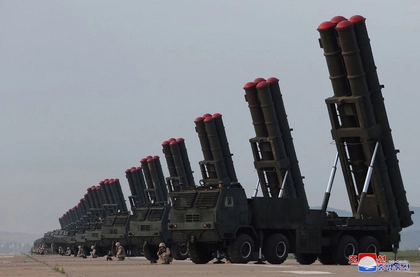On Sunday, Jan. 26, the first round of the presidential elections will take place in Belarus, essentially the announcement of a result predetermined by dictator Alexander Lukashenko. This is first part of the interview, with Pavel Latushko, head of the National Anti-Crisis Management, deputy to Sviatlana Tsikhanouskaya in the United Transitional Cabinet, and former Minister of Culture, who was sentenced in absentia to 18 years in prison by the Belarusian regime in March 2023.
Michał Kujawski: The first round of “elections” in Belarus is about to take place. Can we already say who will win?
JOIN US ON TELEGRAM
Follow our coverage of the war on the @Kyivpost_official.
Pavel Latushko: No one will win. Lukashenko will personally fabricate the results. I’d bet he wants to have 1% more than Putin got in the Russian elections. Putin received 87.3%. Lukashenko would like to write down 88%. Of course, that’s only if Putin allows it. These are not elections – they’re a farce, a “non-election.” You could call it a special operation inspired by the Belarusian KGB and approved by Lukashenko’s office. The sole purpose of this is for Lukashenko to once again appoint himself to the usurped position of President of the Republic of Belarus.

Kim’s Human Blitzkrieg – Ukrainian Troops Reveal North Korean Tactics in Kursk
MK: So the dictator will do the same thing he did in 2020 and before that.
PL: De facto, he legally won an election only once, in 1994. In 2020, he lost massively – there’s no doubt about it. Public opinion hasn’t changed. I know this because Lukashenko is afraid of Belarusians. That’s why he keeps thousands of political prisoners in jail. Can elections even be held when the former candidates from 2020 are jailed? All 11 opposition parties have been dissolved, along with more than half of the country’s NGOs – 1,800 of them. There is no independent press, and media broadcasting from abroad are considered extremist. An atmosphere of fear and terror prevails. Every day, people are detained and sentenced. If Lukashenko claims that society supports him, then why does he repress it and falsify elections?
MK: What has changed since 2020 in terms of the Belarusian opposition? Many of those who protested against the regime, are either in prison or have fled abroad. What can we expect from the opposition? Are protests possible, or are they no longer realistic under the current circumstances?
PL: We have a strategy for the so-called non-election, developed in cooperation with President-elect Sviatlana Tsikhanouskaya, the government in exile, the Coordination Council, and other initiatives. We propose that Belarusians go to the polls and vote against all candidates. Belarusian law – if we can even call it that – permits casting a vote against all. Of course, we know the result will be falsified, and Lukashenko will announce whatever outcome he wants, but we also know the regime will count the votes. They will be aware of what portion of society is against them.
Let’s remember that dictatorship thrives in silence. When no one tries to oppose it, it can do whatever it wants.
MK: And will you, as the opposition, know that?
PL: It will be difficult to determine, but it’s crucial that the regime realizes this. According to public opinion surveys, over 65% of Belarusians want to live in a democratic country. This will serve as an argument when Lukashenko is gone, and, for example, a roundtable discussion takes place.
Sooner or later, that will happen. I know that the elites surrounding Lukashenko are already exhausted; they live in fear but are also aware that Belarusians want democracy. We also have another element to our strategy: ensuring that the democratic world and our partners do not recognize the election results. We cannot allow Lukashenko to restore his legitimacy on the international stage. We have information that Poland, Lithuania, the Netherlands, and the European Parliament will not recognize the results. Let’s remember that dictatorship thrives in silence. When no one tries to oppose it, it can do whatever it wants.
MK: You mentioned the possibility of democratizing Belarus and holding roundtable talks with members of the regime’s establishment who might break away from it. However, many experts believe Belarus cannot count on such a scenario, primarily due to Russia’s growing influence – which was already immense and has now increased significantly. The full-scale invasion of Ukraine has also worsened the situation, as the Belarusian regime is complicit in it. How can democratic change be achieved under such conditions?
PL: I disagree with the notion that Belarus is a lost cause. Public opinion polls suggest otherwise. Over the past four years, the percentage of Belarusians who want to live in an independent country has not decreased; it remains at 97%. That is a foundation to build on. Of course, Russian and pro-Lukashenko propaganda is in full swing, and more and more people see Russia as an ally rather than the West. This presents a challenge for us – the democratic forces – as well as for our European partners.
I also know members of the ruling elite surrounding Lukashenko, including the prime minister, the foreign minister, and other ministers. They are not interested in becoming Putin’s subordinates. The problem lies with some generals whom Russia has corrupted. They vacation in Russia and have millions of dollars in their bank accounts.
On the other hand, let’s remember what the situation was like before 2022. Back then, the military largely wanted to merge with the Russian army to secure higher salaries and better equipment. Do they still want that after the invasion? While the generals may be willing to follow Putin’s orders, soldiers, conscripts, reservists, and younger officers see what is happening and do not want to die. Belarus is not lost yet, but it could be if the EU and our partners do not begin implementing a proactive strategy to support Belarusian society. Some suggest negotiating with Lukashenko because he is supposedly a guarantor of Belarusian independence. But one day, Lukashenko will die. The true guarantor of Belarusian independence is the Belarusian people, and it is with them that we must work. They should have agency and the ability to decide the future of their country themselves.
MK: Some believe that Lukashenko’s successor might be his son, Kolya Lukashenko. Is Belarus heading towards a “hereditary presidency”?
PL: Let me share a story I heard from one of the European presidents, who asked Lukashenko why he doesn’t step away from politics – after all, there’s life beyond it. Lukashenko replied that he was tired but wanted to pass power to Kolya.
Belarus is not a monarchy! Prince Kolya Lukashenko will not be able to rule after his father’s death, and Lukashenko, from the grave, won’t be able to continue his “Lukashism.” That’s what his system is called, just like fascism, Nazism, Leninism, or Stalinism. Contrary to what Lukashenko wants, this system is not eternal.
If the EU doesn’t change its strategy towards the Belarusian regime and nation now, we might find that in a few years, on the EU’s borders… there will be Russian soldiers.
MK: So the regime primarily relies on the loyalty of the security forces to Lukashenko and Moscow?
PL: Absolutely. I won’t hide the fact that some members of the special forces and security services are sympathetic to Russia. I know that some even have Russian flags in their offices. However, we must remember that, in the end, when Lukashenko is backed into a corner, he will beg and plead for support from the Belarusian people and Europe. That will be the moment when everything could be possible.
MK: You mentioned the need for greater engagement from the West and the EU. What do the Belarusian nation and the democratic forces need?
PL: The European Union is preparing for war with Belarus – let me try to substantiate this claim. The EU wants Belarus to be democratic and pro-European. This would ensure there is no threat to Belarus’s neighbors or the rest of the EU.
But let’s look at what is happening. Security policy is one of the main topics of Poland’s presidency in the EU, and this raises no controversy among most members. What message is Belarus sending today? The opposite – it is a threat.
Let us recall the start of the Russian invasion of Ukraine. Before it began, President Zelensky appealed to the West for help, arms, and sanctions. The West didn’t respond. We asked for the support and sanctions on the regime in 2020. The lack of decisive action then led to the situation in 2022, where Lukashenko was already Russia’s ally against Ukraine.
If the EU doesn’t change its strategy towards the Belarusian regime and nation now, we might find that in a few years, on the EU’s borders with Lithuania, Latvia, Poland, and Ukraine, there will be Russian soldiers, or even Belarusians in Russian uniforms, ready to attack these countries.
Only proactive, preventive measures can help avoid this scenario. We urge the EU to support us with resources for pro-European and pro-democratic information campaigns in Belarus. Right now, there is a battle for the minds and views of Belarusians. The EU should tighten and enforce sanctions to make the Belarusian regime costly for Russia. The goal is to create a split in the ruling elite and bring Lukashenko before the International Criminal Court, demonstrating that his rule has no future.
It is crucial to support Belarusian society, invest in education, and close borders for goods but not for people, to avoid isolating Belarus like North Korea. Supporting independent media and political institutions as alternatives to the regime is also key, as these efforts will yield results in the long term.
MK: Belarus and Russia are conducting very intense cognitive operations against the West. Social media is full of anti-Western or anti-Ukrainian content.
PL: The amount of Russian disinformation is significant. We see it in Poland, in Germany, and in other countries.
You can also highlight the text and press Ctrl + Enter











